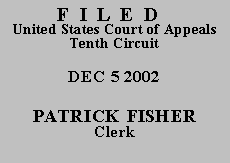

| JAMES NATHAN TYSON,
Petitioner - Appellant, v. DAYTON POPPEL, Respondent - Appellee. |
|
Before KELLY, BALDOCK, and LUCERO, Circuit Judges.
Petitioner James Nathan Tyson seeks a certificate of appealability (COA) from this court in order to appeal the district court's order denying relief in his motion filed pursuant to 28 U.S.C. § 2254. We deny Mr. Tyson's application and dismiss the appeal.
Mr. Tyson filed his habeas petition after the effective date of the Antiterrorism and Effective Death Penalty Act (AEDPA). Therefore, review of his claims is governed by its provisions. See Wallace v. Ward, 191 F.3d 1235, 1240 (10th Cir. 1999).
Under AEDPA, Mr. Tyson must obtain a COA before he can proceed on appeal. 28 U.S.C. § 2253(c)(1). To be entitled to a COA, he must make a "substantial showing of the denial of a constitutional right." § 2253(c)(2). He can make this showing by establishing that "reasonable jurists could debate whether (or, for that matter, agree that) the petition should have been resolved in a different manner or that the issues presented were adequate to deserve encouragement to proceed further." Slack v. McDaniel, 529 U.S. 473, 484 (2000) (quotation omitted).
In 1997, Mr. Tyson was convicted by a jury of first-degree manslaughter and sentenced to thirty-five years' imprisonment. The Oklahoma Court of Criminal Appeals affirmed his conviction on appeal. Mr. Tyson filed a post-conviction petition in state court which was denied.
He then filed this petition in federal district court in which he alleged he was denied effective trial and appellate counsel because counsel did not advise him of, and preserve, his right to a bifurcated trial. He also alleged counsel was ineffective due to a conflict of interest because he was originally represented by an attorney who was then appointed to the district attorney's office. Petitioner also alleged the presiding trial judge was biased because the judge had helped the former public defender get his new position after the judge was appointed to the bench.
The district court denied relief on his first claim, holding that he could not meet the prejudice prong of Strickland v. Washington, 466 U.S. 668 (1984). The court noted that because Mr. Tyson had not raised his conflict of interest claims in state court, they were procedurally barred. The court also held that Mr. Tyson had failed to show cause and actual prejudice for the failure or a fundamental miscarriage of justice should the court not consider those claims. The court also noted that Mr. Tyson was not claiming actual innocence.
On appeal, Mr. Tyson argues that the district court should have held an evidentiary hearing on his claims. He also asserts that the court erred in holding that the state courts' determinations were not contrary to, or an unreasonable application of, federal law.
We have reviewed the record and the applicable law and conclude that Mr. Tyson has failed to make a "substantial showing of the denial of a constitutional right." 28 U.S.C. § 2253(c)(2). Reasonable jurists could not debate whether his § 2254 "petition should have been resolved in a different manner" or whether "the issues presented were adequate to deserve encouragement to proceed further." Slack, 529 U.S. at 484 (quotation omitted). Therefore, we deny a COA and DISMISS this appeal. The mandate shall issue forthwith.
Entered for the Court
Circuit Judge
*. This order and judgment is not binding precedent, except under the doctrines of law of the case, res judicata, and collateral estoppel. The court generally disfavors the citation of orders and judgments; nevertheless, an order and judgment may be cited under the terms and conditions of 10th Cir. R. 36.3.